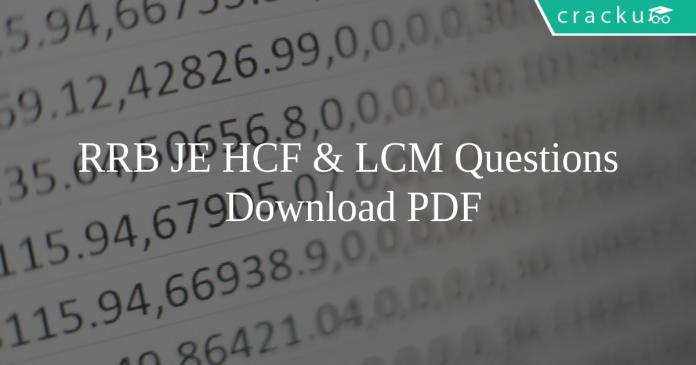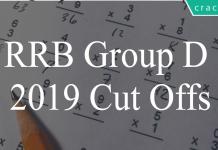RRB JE HCF & LCM Questions PDF
Download Top 20 RRB JE HCF & LCM Questions and Answers PDF. RRB JE Maths questions based on asked questions in previous exam papers very important for the Railway JE exam
Download RRB JE HCF & LCM Questions PDF
Download RRB JE Previous Papers PDF
Question 1: What is the product of LCM and HCF of two numbers having their product as 120 and sum as 22?
a) 120
b) 240
c) 300
d) 360
Question 2: The HCF of two numbers 24 and their LCM is 216. If one of the number is 72, then the other number is
a) 27
b) 72
c) 8
d) 24
Question 3: The product of two numbers is 2160 and their HCF is 12. Numbers of such possible pairs is
a) 1
b) 2
c) 3
d) 4
RRB JE Free Mock Test (latest pattern)
Question 4: A number between 1000 and 2000 which when divided by 30, 36 & 80 gives a remainder 11 in each case is
a) 1451
b) 1641
c) 1712
d) 1523
Question 5: The number between 4000 and 5000 that is divisible by each of 12, 18, 21 and 32 is
a) 4302
b) 4032
c) 4023
d) 4203
Question 6: The difference between two numbers is 1146. When we divide the larger number by smaller we get 4 as quotient and 6 as remainder. Find the larger number.
a) 1526
b) 1431
c) 1485
d) 1234
18000+ Questions – Free SSC Study Material
Question 7: The sum of two numbers is 7 and the sum their squares is 23, their product is equal to:
a) 10
b) 11
c) 12
d) 13
Question 8: Find the HCF of the following fractions.
$\frac{5}{12}$, $\frac{15}{14}$, $ \frac{25}{21}$
a) $\frac{10}{21}$
b) $\frac{5}{84}$
c) $\frac{5}{42}$
d) $\frac{5}{21}$
Question 9: Find the HCF of 3/8, 17/19 and 21/23.
a) 1/2392
b) 1/3192
c) 1/3128
d) 1/3496
Question 10: Find the HCF of 0.8, 0.125, 0.625 and 0.5.
a) 0.1
b) 1/40
c) 1/20
d) 1/80
Question 11: Find the LCM of 3/4, 5/8 and 9/27.
a) 15
b) 45
c) 1/24
d) 1/48
Question 12: Find the HCF of 8/3, 12/7 and 13/12.
a) 1/504
b) 1/126
c) 1/84
d) 1/1008
Question 13: Find the HCF of 2/3 , 6/8, 7/12 and 2/5
a) 1/120
b) 1/60
c) 1/30
d) 1/240
Question 14: The LCM of two numbers is 4 times their HCF. The sum of LCM and HCF is 125. If one of the numbers is 100, then the other number is
a) 5
b) 25
c) 100
d) 125
Question 15: What is the HCF of 7/9, 2/3, 5/8 and 7/12?
a) 1/18
b) 1/36
c) 1/144
d) 1/72
Daily Free Online Tests for RRB Exams
Question 16: What is the LCM of 64 and 56?
a) 448
b) 488
c) 484
d) 408
Question 17: Find the HCF of $\frac{2}{3}, \frac{1}{2}, \frac{3}{5}$
a) 6
b) $\frac{1}{30}$
c) $\frac{1}{15}$
d) $\frac{1}{10}$
Question 18: The H.C.F. and L.C.M. of, two numbers are 8 and 48 respectively. If one of the numbers is 24, then the other number is
a) 48
b) 36
c) 24
d) 16
Question 19: Two numbers are in the ratio 3:4. Their L.C.M. is 84. The greater number is
a) 21
b) 24
c) 28
d) 84
Question 20: The sum of two numbers is 36 and their H.C.F and L.C.M. are 3 and 105 respectively. The sum of the reciprocals of two numbers is
a) 2/35
b) 3/25
c) 4/35
d) 2/25
General Science Notes for RRB Exams (PDF)
Answers & Solutions:
1) Answer (A)
Given $a\times b$=120
a+b=22
Substituting a=$\frac{120}{b}$
We have $\frac{120}{b}$ + b=22
$b^{2}-22b+120$=0
Solving we get b=10,12
LCM of 10 and 12 =60
HCF of 10 and 12 =2
Product of LCM and HCF=120.
2) Answer (B)
Let the number be $a$ and other number = $b=72$
We know that : $H.C.F(a,b)\times L.C.M.(a,b)=a\times b$
=> $a\times72=24\times216$
=> $a=\frac{24\times216}{72}$
=> $a=24\times3=72$
=> Ans – (B)
3) Answer (B)
H.C.F. of the two numbers is 12, let the numbers be $12x$ and $12y$, where $x$ and $y$ are co-prime
Product = $(12x)\times(12y)=2160$
= $xy=\frac{2160}{144}$
=> $xy=15$
Now, factors of 15 = 1, 3, 5, 15
Thus, possible values of $(x,y)=(1,15),(3,5)$
$\therefore$ 2 such pairs are possible.
=> Ans – (B)
4) Answer (A)
LCM of given 3 numbers (30, 36, 80) = 720
Multiple of 720 between 1000 and 2000 is 1440.
$\therefore$ Number which gives a remainder 11 in each case (1440 + 11) = 1451
Hence, option A is the correct answer.
5) Answer (B)
LCM of 12,18,21,32 is 252
Multiples of 252 between 4000 and 5000 are 4032, 4284, 4536, 4788.
4032 is present in the options.
Hence, option B is the correct answer.
6) Answer (A)
Let the smaller number be $x$ and the larger number = $(x+1146)$
According to ques, on dividing the larger term by smaller one,
=> $(x+1146)=4x+6$
=> $4x-x=1146-6$
=> $3x=1140$
=> $x=\frac{1140}{3}=380$
$\therefore$ Larger number = $380+1146=1526$
=> Ans – (A)
7) Answer (D)
Let the numbers be $x$ and $y$
It is given that $x^2+y^2=23$ ———–(i)
Also, $x+y=7$
Squaring both sides, we get :
=> $x^2+y^2+2xy=49$
=> $23+2xy=49$
=> $2xy=49-23=26$
=> $xy=\frac{26}{2}=13$
$\therefore$ Product of the numbers = 13
=> Ans – (D)
8) Answer (B)
$\frac{5}{12}$, $\frac{15}{14}$, $ \frac{25}{21}$
We know that HCF of fractions is given by
$\frac{\textrm{HCF of fractions}}{\textrm{LCM of fractions}}$
So applying this we can calculate the required fraction.
HCF of 5, 15 and 25 is 5.
LCM of 12, 14 and 21 is 4*3*7 = 84
Hence, the required HCF will be $\frac{5}{84}$
9) Answer (D)
HCF of fractions = HCF of the numerators / LCM of the denominators.
All the fractions must be in their empirical form to apply this formula.
The HCF of (3,17,21) is 1.
The LCM of (8,19,23) is 3496.
Therefore, the HCF of the given fractions is 1/3496.
Hence, option D is the right answer.
10) Answer (B)
HCF of fractions = HCF of the numerators / LCM of the denominators.
All the fractions must be in their empirical form to apply this formula.
0.8 = 4/5
0.125 = 1/8
0.625 = 5/8
0.5 = 1/2
The given numbers can be written as 4/5, 1/8, 5/8, 1/2.
HCF of the numerators = 1.
LCM of the denominators (5,8,2) = 40.
Therefore, the HCF of the given numbers will be 1/40 or 0.025.
Therefore, option B is the right answer.
11) Answer (A)
LCM of fractions = LCM of the numerators / HCF of the denominators.
All the fractions must be in their empirical form to apply this formula.
9/27 can be reduced to 1/3.
Therefore, the given fractions are 3/4, 5/8 and 1/3.
LCM of the numerators (3,5,1) is 15.
HCF of the denominators (4,8,3) is 1.
Therefore, the LCM is 15/1 = 15.
Hence, option A is the right answer.
12) Answer (C)
HCF of fractions = HCF of the numerators / LCM of the denominators.
All the fractions must be in their empirical form to apply this formula.
HCF of the numerators (8,12,13) is 1.
LCM of the denominators (3,7,12) is 84.
Therefore, the HCF of the given fractions is 1/84. Hence, option C is the right answer.
13) Answer (B)
HCF of fractions = HCF of the numerators / LCM of the denominators.
All the fractions must be in their empirical form to apply this formula.
6/8 can be written as 3/4.
The given fractions are 2/3, 3/4, 7/12 and 2/5.
HCF of the numerators = 1.
LCM of (3,4,12 and 5) is 60.
Therefore, the HCF of the given fractions is 1/60.
Hence, option B is the right answer.
14) Answer (B)
Let one of the numbers = $x$ and other number = 100
Let L.C.M = $L$ and H.C.F = $H$
According to ques, => $L=4H$ ————–(i)
and $L+H=125$
Substituting value from equation (i), we get : $4H+H=5H=125$
=> $H=\frac{125}{5}=25$
=> $L=4\times25=100$
Thus, product of numbers = $L\times H$
=> $100\times x=100\times25$
=> $x=25$
=> Ans – (B)
15) Answer (D)
HCF of fractions = (HCF of the numerators)/ (LCM of the denominators).
HCF of 7,2,5 and 7 is 1.
LCM of 9, 3, 8 and 12 is 72.
Therefore, the HCF of the given fractions is 1/72.
Option D is the right answer.
16) Answer (A)
(diagram)
so LCM of 64 & 56 is = 8*8*7 = 448
So the answer is option A.
17) Answer (B)
HCF = HCF of numerators/ LCM of denominators
HCF of 1, 2, 3 = 1
LCM of 3, 2, 5 = 30
Hence, $\frac{1}{30}$
18) Answer (D)
Given:-
Numbers- First = 24
Second = x (suppose)
H.C.F. of numbers = 8
L.C.M. of numbers = 48
As we know:
H.C.F.* L.C.M. = Product of numbers
Hence
48*8 = 24*x
x = 16
19) Answer (C)
Let the numbers be 3x, 4x
LCM of 3x and 4x is = 12x
So the number 84 is divisible by 12
$\frac{84}{12}$ = 7
The numbers are 7×3 = 21 , 7x 4 = 28
The greatest number is 28
20) Answer (C)
let’s say numbers are $x$ and $y$
hence sum of the reciprocals will be $\frac{1}{x} + \frac{1}{y}$
or $\frac{x +y}{xy}$
as $x+y$ = 36 (given)
and $xy$ = $HCF \times LCM$
= $3 \times 105 = 315$
after putting the values we will get summation of reciprocals equals to $\frac{4}{35}$
DOWNLOAD APP FOR RRB FREE MOCKS
We hope this HCF & LCM Questions for RRB JE Exam will be highly useful for your preparation.





